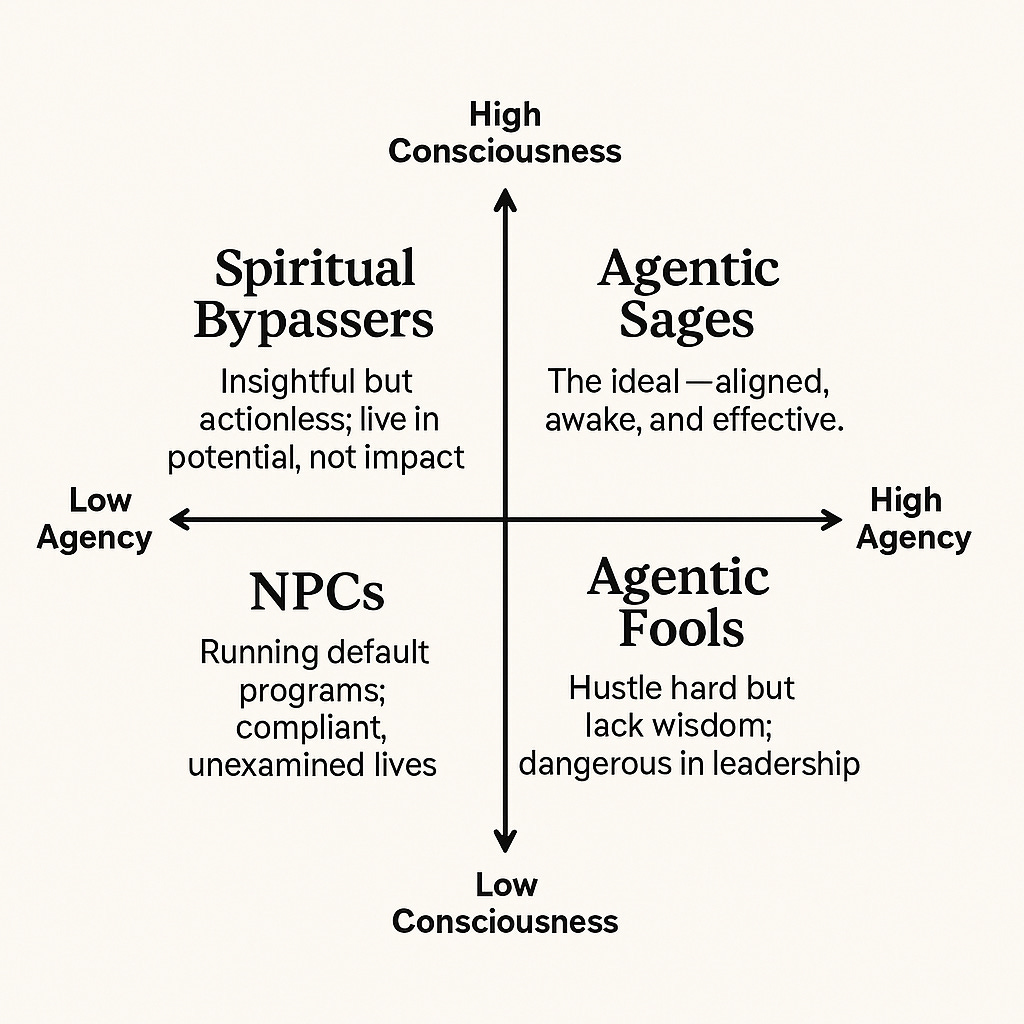Join the Integration Economy

[This article has a 6/10 Woo Rating]
I am immediately suspicious of people who write grand plans to overhaul capitalism. I’ll leave that to abstracted academics or stoned students. But there are ways of creating concurrent systems that are healthier and more fun. This piece is about one modest vision, for one small corner of the world. But it’s immediately accessible and beneficial to you as an individual, today.
Cancerous Capital
One of my favourite concepts is “Chesterton’s Fence,” which argues that you shouldn’t remove a fence before you understand why it was put up in the first place.
Western medicine has typically taken a very dim view of treatments with an energetic component. This is despite the fact that many other cultures have been using them for thousands of years. These can include ayurveda, acupuncture, reiki, homeopathy1 and maybe even crystals. We’ve largely eradicated diseases caused by “small things” we can measure, like viruses or bacteria. And now, every year, 40% of Americans die from cancer or heart disease. Is this because we’ve failed to eradicate diseases caused by “big things,” most obviously our overall lifestyle, but perhaps also by energetic flow?
Thanks to
John Stoszkowski, I recently discovered the work of the late nutritional author Ray Peat. Peat explored this exact theme, and his conclusion was neatly summarized by John:2
His answer, stripped to its essence, is this: life becomes what it has the energy to perceive, feel, and create. The more energy we have, the more possibility we can hold. Suffering, in this view, is often a sign of blocked energy, whether in cells, minds, or societies. Health is the free flow of energy, enabling adaptation and growth. And how we live? By aligning with life’s creative impulse, not resisting it.
This concept has made me consider the concept of flow or blockage more deeply. More specifically, something is “dissociated” when energy can’t flow through it, and when it’s “integrated” it can. It’s one of those universal themes that seems to pop up in a lot of really important places:
- Biologist Michael Levin has argued that cells turn cancerous due to a failure in bioelectric communication. Dissociated from the energetic field of the body, they grow at its expense.3
- At extremes, our brain’s left hemisphere is dissociated from the whole and acts in naive, self-interested ways. It is perhaps also worth noting that the heart is an electromagnetic transmitter and receiver, and is significantly more connected to the right hemisphere than the left.
- Internal Family Systems says that parts of our psyche can get “exiled,” then drain our energy and create havoc.
- Dissociated from the broader environment, corporations pollute and destroy at the expense of the whole.
- Humanity itself, energetically disconnected from life on earth, destroys other species at a rate that’s pathological. [I’m sure our breakneck development of dissociated superintelligent AI will go just swimmingly too].4
Because reductionist science has trouble recognizing systems as unified wholes, we've dismantled the “Chesterton’s Fence” that once helped us understand how energy should flow through complex adaptive systems.
Money is one of the biggest causes of energetic dissociation in the Western world.5 Money is neither intrinsically good or bad. Like everything else in the universe, money is energy and it needs to flow freely. And, like everything else, dissociation makes it potentially destructive. A cancerous approach to money would be pursuing it for its own sake, then stockpiling in bank accounts rather than letting it flow through the system. Money then starts growing at the cost of life.
As a macro level, power laws have concentrated an increasingly large amount of wealth in a smaller number of hands. This creates inequality, alienation, imbalance and stagnation. At a micro level, I consistently see “energetically blocked” people in the grip of stasis or dissociation becoming even more focused on saving for future uncertainty when they could be spending on integration.
The cure for disconnection is integration, not further repression. Healthy evolution transcends AND includes what has gone before. Economist Peter Koenig has spent 40 years exploring our psychological relationship with money.6 He talks about loving money from the perspective of an energetic flow. “It feels fantastic to say ‘I love money,’ and mean it.” He continues, “It's like anything else that one can love. Or a person that can love. The feeling is the same. Because actually it's not disconnected. It's connected to the relationship. It's connected to my relationship to myself, and it's connected to my relationship to the other person.”
This attitude shifts money from a cause of disconnection to a facilitator of integration.
We can use money to enhance loving relationships between people, creations and healing. We can use it to express gratitude or turbocharge our own growth.
A Fool and His Money
My dream for the emerging World Wise Web is that we will grow intimate ~150 person communities based around the evolution of what
Peter Limberg calls “wise agency.” These networks will share resources, practitioners and ideas around the most effective methods of personal growth. This could create pockets of wise, flourishing and powerful people able to effect real positive change in the world. In Peter’s excellent framing- he calls these people “agentic sages.”

I suspect a key factor in whether “agentic fools” and “spiritual bypassers” can become “agentic sages” is their attitude to money (and therefore energy and power). A helpful framing is money coach Nadja Tarancszewski’s money projections:
- I suspect some spiritual bypassers tend to have unconscious negative projections onto money. Money is dirty and immoral and therefore they shouldn’t charge for their intuitive gifts. They therefore dissociate themselves from the flow. This means they are always struggling to make ends meet. They lack the agency and resources to make the kinds of positive change they want to see in the world.
- In contrast, agentic fools tend to have unconscious positive projections onto money. Money is an indicator of their self-worth and safety. But this means they fear losing it and pursue it for its own sake. By trying to control and hoard the flow they actually block it. This means they end up exacerbating cancerous capital dynamics while feeling increasingly dead inside.
- The agentic sage is optimally integrated into the flow. They do what they love, in service of love and are rewarded for that value they create. Because they are aligned with life’s creative energy they are effortlessly powerful.
For both fools and bypassers, the primary barrier to agentic sagehood that I’ve observed across hundreds of conversations is the belief that our own separation from “source” makes us somehow without intrinsic value. If we return our unique gifts to the energetic flow, will we be appropriately valued and materially comfortable? It may genuinely be possible to live in such a way that you follow the Tao with total surrender the money just comes. But for most of us, our starting point is living in expensive places with careers and families to support.
This means that the healthy integration of your relationship with money is an excellent place to start your own work.7 A safe attachment style lowers the amount of money you need to feel safe, and therefore the barrier to a life path that gives you more energy. Doing something you love in the present makes you less comparative and anxious about the future. As you gain confidence in your value, charging more for your work helps resolve more of your money blockages, which integrates you even more.
You’ll anticipate a critical open question at this point. Is it even possible to be an agentic sage contributing in full integrity within a cancerous economy? Either way, as capitalism slowly falters, I believe we are going to need transitional walled-gardens, or lifeboats, like the Integration Economy.
The Integration Economy.
The Integration Economy is a parallel system that restores the flow of energy in order to heal physical, psychological, and societal dissociation.
The Integration Economy is a party, in a lifeboat, on a sinking ship. We have no idea how long the ship will take to sink. But being on a sinking ship with other panicking people is decidedly no fun at all. Thankfully there are enough lifeboats for everyone, and all the parties have different vibes.
Choosing this path means exploring ways to integrate your own consciousness and that of others around you. Psychologically, this means bringing together different parts of yourself into an energetic whole. There are a vast number of professions that help with the integration of consciousness. They include coaches, therapists, IFS practitioners, breathworkers, writers and teachers. Physically, I also believe we will see people moving into the more “woo-adjacent” modalities like intuitives and energy healers, especially as science re-validates many of them.8 The flow of capital into the Integration Economy is probably going to prompt Western medicine to reexamine the realities of energetic blockage.
Optimistically, this increased flow of transparency and capital could create a more efficient market for integrating master practitioners and dissociating the charlatans. But realistically, it’s also why you need walled-garden communities to share feedback and cultivate discernment. As a community, The Leading Edge has been experimenting with a wide variety of practitioners and has created a trusted informal database.9 It’s probably not something you should leave to Yelp, Google or ChatGPT.
As more money and energy flows into the Integration Economy, we should expect it to become more positively impactful. As you become more integrated as a leader or developmental coach, you can diagnose a wider array of blocks. This includes bigger problems for more powerful people. This allows you to earn more money and charge more money.
Many people get justifiably triggered by the idea of charging large sums for developmental work. We have centuries worth of warnings about how this relationship gets corrupted. But if you’re a healer deliberately dissociating yourself from the flow of money you’re not putting yourself in a position to heal cancerous capital. Many powerful people are successful because they are dissociated. They are masters of abstractions or competing at all costs. Cancers grow fast! Powerful people tend to have more money, and often require a greater energetic commitment to personal growth. One of coach Brian Whetten’s most resonant insights is that 10% of the value of any transformational “container” comes from the coach’s expertise, 30% from the relationship between coach and client and 60% from the commitment the client brings to the relationship. The energy of money makes it an excellent commitment device.
An extraordinarily wealthy person once asked me to introduce him to the best coach I know. This coach charges about $800 an hour. It’s an unattainably significant sum for many people. But for this particular client it was far too little. He flaked on all the sessions he’d bought to go surfing. If those sessions had cost $10,000 he probably wouldn’t have missed them and he probably would have gotten more transformational value from them.
Working with powerful people creates a positive upward spiral. You can integrate them back into the energetic whole, which then heals the whole system. This leads to an enormous amount of power running through you.
This presents a critical, and rather scary, necessity in the Integration Economy. You always need to keep the money flowing. You can’t hold onto the money, energy or power. This is one reason most gurus go wrong the moment they achieve fame and power. One excellent way of maintaining the flow is pay other people to help you with the evolution of your own consciousness. This also prevents you from becoming a megalomaniac cult leader, especially if you’re paying for teachers who are more advanced than you are. And the more money you make, ideally the more powerful teachers you can afford!
Come Join the Party
I would speculate, with a high degree of certainty, that the average person is not allocating enough of their money to personal integration. The opportunity cost of hoarding those excess rainy day savings is losing the personal dynamism that makes you more resilient for when a storm actually comes. Here are some practical tips for getting started:
- Start a community. Here’s the blueprint I used for The Leading Edge.10
- Join a community. It’s early, so there isn’t really a directory for other wisdom communities yet. Here is a Andrew Murray Dunn’s attempt to create a map.
- Experiment with and share integrative resources. Here are some of the traditional practices The Leading Edge has found most effective. Here are some of the more woo areas I’ve explored.
- Explore paying for your own integration. Money Work is obviously a good start! More generally, it helps to simply reflect on what modality or practice excites you.
- Cultivate your own gifts. Check out Brian Whetten’s playbooks for making money with integrity as a coach and becoming an authentic leader.
Joining the Integration Economy is fun, but scary. It involves paying for the uncertain and often disruptive pursuit of personal growth. It can involve charging for your unique intuitive gifts. If can require the faith to let go of real wealth and security to recirculate the energy you’re accumulating. None of these are consensus paths in the cancerous economy. Practically everyone I speak to thinks they are doing this alone, and maybe even shirking their responsibilities to their families, parents or culture. Both of these are not just untrue, I increasingly believe reintegrating money is the main quest for humanity right now.
Putting your hard-earned money into the Integration Economy may feel like at best a cost, and at worst a waste. It may also feel self-indulgent relative to the more established paths of philanthropy or impact investing. But it’s actually a win-win. The more integrated your consciousness is, the more highly attuned you become to new opportunities. You become more connected to the flow of energy, which in a very real sense gives you more power in the world. This allows you to find higher integrity professional niches and makes you more adaptive. You can then become a higher integrity leader and healer, and help more people. To return to Peat’s conclusion: “The more energy we have, the more possibility we can hold.”
1 I recommend this wonderful piece Searching for Remedies on Edward Bach’s work on homeopathy by Kheiron
2 This is an excellent read: Ray Peat and the Art of Becoming
3 This conversation with Iain McGilchrist was mindblowing.
4 Here is my slightly freaked-out article for Hurry Up We’re Dreaming.
5 Check out my latest piece on The Fog of War.
6 I’ve been fortunate to know Peter for a few years and he’s a close collaborator of money coach Nadja Taransczewski who I interviewed last year.
7 Check out Nadja’s CU Money for one modality. Nadja’s two-part article on this topic is really worth reading. “If money in principle has a hard time finding its way to you and you often fight for resources, you probably have unconscious negative projections (Type 1) onto money. If you have money but are often worried about losing it or concerned about how to acquire more, you probably have unconscious positive projections (Type 2) onto money. And if you earn money but somehow never have any money, if you are often plagued by feelings of guilt and then voluntarily and involuntarily find ways to get rid of money as quickly as possible, then it is likely that you are wavering between the projections of both types, between disgust and greed (Type 3).”
8 Primarily due to referrals from the group, I’ve personally seen about twenty traditional and woo-adjacent practitioners in the last few years and wrote up my findings.
9 I try to only recommend people I have personal experience with or have lots of strong secondhand data from friends and LE members. So this group would include: transformational coaches Devin Martin and Brian Whetten, Money coach Nadjeschda Taranczewski, intuition coach and breathworker Işik Tlabar, Somatic and “right hemisphere” coach
River Kenna, Jungian psychoanalytic psychotherapist and dreamwork expert Dan Lawrence, intuitive guide Allison Paradise/Allison Paradise. Happy to share higher woo-rating discoveries on request.
This week in the community we reflected on the single most effective practice we’ve encountered, especially in the first year of Leading Edge. Meditation and breathwork obviously remain popular. Members have also enjoyed Money Work, which isn’t surprising as half of the group are investors. Other interesting answers were sending love, radical honesty, reclamining projections, “Earth School” (my answer), Integral Life Practice, dance, vocalization and Yoga Nidra.
10 I was rather moved by Bodhi’s review of his time in Leading Edge: “Maybe I’m biased as a member of Leading Edge, but I can say with zero hesitation (and no exaggeration) it’s one of the single best things that’s ever happened to me in my life.”




